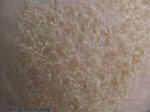Work Out Which Types Of Eczema You Have,
And Manage And Treat It Right
Eczema is usually thought to be one condition. There are in fact a number of different types of eczema.
They all generally have similar symptoms, but can look different. The way they look is how some types have got their name. Others are named because of their position on the body.
Adults tend to be affected by the different eczema types more than children.
It is quite usual for adults to have more than one type of eczema.
This can make it slightly harder to manage, but definitely not impossible.
It is important to get a correct diagnosis. It makes managing and treating easier.
Common Types Of Eczema
You can read through the following brief descriptions of the types of eczema. Click on any of their links if you would like to learn more about them.
- The most common type is Atopic Dermatitis. It mainly affects children. Most have their first outbreak before the age of 5 years. Adults normally have it when they have suffered from it since childhood. It is rare to have your first flare up in adulthood
- One of the other common types of eczema is Contact Dermatitis. There are two forms Irritant Contact Dermatitis (ICD) and Allergic Contact Dermatitis (ACD). As the name suggests, they are caused by contact with a problem substance, a trigger. There is a difference between an irritant and an allergen. An irritant causes an immediate reaction. An allergen causes a reaction that has built up over time. It can take a little time for the symptoms to appear. Both can be managed very well when the irritants and/or allergens causing the symptoms are discovered
- One stubborn type of eczema is Nummular Eczema. Not as easy to manage, but it is still treatable with persistence. The name describes the look of an outbreak. It can be quite distressing as it is very itchy. This distinguishes it from the similar looking psoriasis. Which is not an itchy condition
- Dyshidrotic Eczema affects mainly the hands, and sometimes the feet. It has a look that makes it easily recognisable. It can be treated but is very likely to reoccur. But there are ways to help reduce the number of outbreaks
- Commonly known as Stasis Dermatitis, this form is normally found on the bottom part of the legs. Another name for it is Varicose Eczema, describing the source of the symptoms. It is more selective with the people who suffer from it. Basically, people who are more prone to varicose veins
- Seborrhoeic Dermatitis mainly affects the scalp. Sometimes it is found on the face too. It is flaky and dry, appearing as dandruff. There are special treatments for the scalp that can improve the condition massively
- Cradle Cap is the infant equivalent to Seborrheic Dermatitis. It also mainly tends to affect the scalp. It is found on around half of babies. Over time the condition clears. Although another form of eczema may appear instead. It is painless and doesn’t tend to itch. So the baby is generally unaffected by it.
- Asteatotic Eczema is an extremely dry condition. It has a certain look about it. It mostly tends to affect older people. Moisturising is a very important part of treatment. It sometimes gets confused with Stasis Dermatitis.
Complications Of Eczema
There can be some complications with eczema. There are two main ones. They tend to need a stronger treatment, for a longer time.
- The Staph Aureus Infection is caused by the bacteria Staphylococcus aureus. It is more stubborn than atopic dermatitis. With the right treatment it can be managed properly.
- Eczema Herpeticum is a complication of atopic dermatitis. It is caused by the herpes simplex virus. Once diagnosed it is quickly treated to prevent any further problems.
Other Types Of Eczema
There is also a type of eczema that can affect your dog. It can be quite severe, but with the right treatment and taking the right precautions it can be managed
Return from Types of Eczema to What is Eczema
Search What Is Eczema?
Advertising on What Is Eczema?
We are a participant in the Amazon Services LLC Associates Program, an affiliate program which allows sites to earn fees by advertising and linking to amazon.com. If you make a purchase through a link on this page, I may receive a small commission, at no extra cost to you. Many thanks
